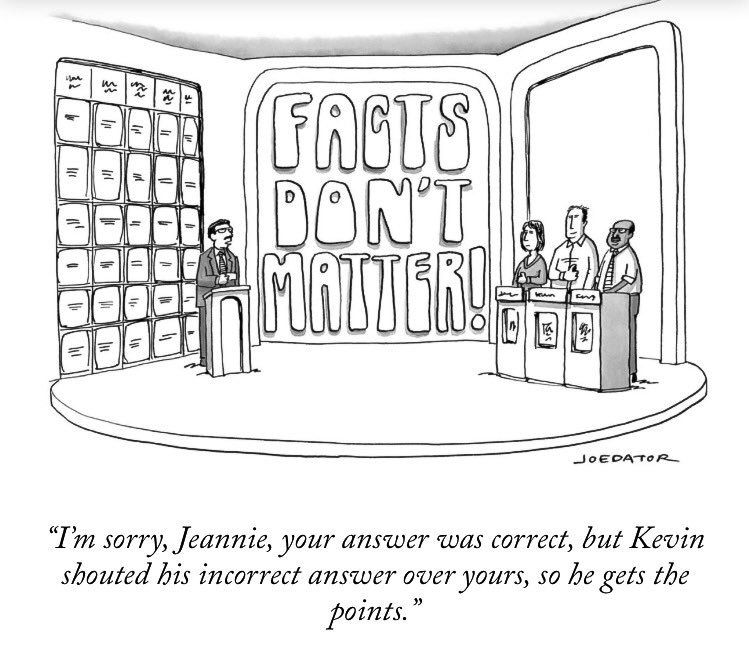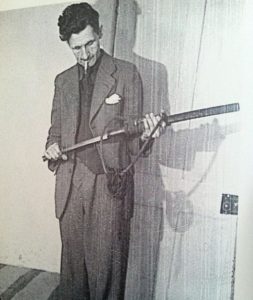We Begin.
- Thursday, February 4: Truthtelling, Untruthtelling, and Democracy
Opening Discussion Theme: What is Truth? And why should Truth matter when we talk about Politics?
At first glance, it might seem easy to answer these questions. For example, one could say that Truth is about facts, not lies. Hence, politics is about whether politicians tell the Truth or simply lies. Although both propositions are accurate, I shall suggest that they only scratch the surface of much broader topic. Facts are important–indeed, in short supply these days among public officials! Yet, Truth has a much more profound meaning. In a courtroom, one swears to tell the “whole truth and nothing but the truth” (see HERE). What is the whole truth? Similarly, when we pose a question about Politics, we are addressing an equally profound theme. If we are telling “the whole truth,” what does it mean to say we should tell “nothing but the truth”?

What, then, do we mean by “Truth” and “Politics”? In this first section of our course, we will consider a variety of themes that will help us to answer this question. They include: citizenship, liberty, domination, political elites, popular participation, language, and the erosion of trust.
Please begin reading Ray Bradbury’s Fahrenheit 451. Bradbury raises issues that will concern us throughout the semester. We will discuss the book next Thursday.
2. Thursday, February 9: America’s Problem with the Truth
Discussion theme: Untruthtelling is rampant in America.
In this section, we lay the foundations for understanding the “problem of truth” in American politics by considering two types of untruth. One type is the deliberate distortion of the Truth; the other is or may be–depending on your personal judgment–an example of not telling the whole Truth. Our goal is to begin developing the vocabulary for analyzing the many, many cases of truth-telling and untruth-telling that will arise throughout our seminar.
NOTE: I have organized these readings/videos in such a way that they pose greater challenges to our definition as you move through them. The idea of “telling the whole truth” is particularly important in the video by Ron Paul.
Deep fake video of Biden admitting to voter fraud: WATCH
NPR: “Nearly Half Of Accounts Tweeting About Coronavirus Are Likely Bots” READ
Sheera Frenkel and Davey Alba, Digital Edits, a Paid Army: Bloomberg Is ‘Destroying Norms’ on Social Media,” New York Times, February 22, 2020 PRINT AND READ
“Dr. Ron Paul’s Urgent Message for Every American” LISTEN, TAKE NOTES, CRITIQUE
Paragraph Assignment (Due today): “Is Ron Paul telling the Whole Truth and Nothing but the Truth?”
3. Thursday, February 11: Living in a Land of Untruth.

Ray Bradbury, Fahrenheit 451: READ the Introduction by Neil Gaiman and Chapters I and II
Today, I am particularly interested in discussing Montag’s world. Think about these issues: 1) What are the characteristics of this world and what would it be like to live in it? 2) What holds this world together? Is it simply force? and 3) How would you act if you lived in this world?
Our world:
To what extent does our behavior resemble the behavior of the Mildreds in Fahrenheit 451? What are the essential differences between Bradbury’s fictional world and our own?
Wendy Treynor, “Why People become Sheeple,” Psychology Today, November 10, 2015″ PRINT AND READ
4. Tuesday, February 16: Pursuing the Truth
Ray Bradbury, Fahrenheit 451, Chapter III
Today, we concentrate on Montag’s bid for independence. What causes him to make this break? In Bradbury’s world, will he remain an exception to the rule?
Our world:
Does Martin Luther King argument give us reason for hope? Or are people like King the exception to the rule when it comes to truth telling?
Martin Luther King, Sermon, Selma, Alabama, March 8, 1965 PRINT AND READ
5. Thursday, February 18: Great Writing and the Art of Persuasion
In preparation for your essay assignments in this course, let’s talk about what constitutes great writing.

I love George Orwell. Thus, I assign his writings, especially the two below, again and again. Seven decades after his death, Orwell continues to provide us with fresh insight into the study politics. There are two reasons why his essay “Politics and the English Language” remains as power today as it was when he wrote it in 1946.
-
- His argument is all about the ways in which words can be used and abused to undermine democracy. He wrote it at a time when he had become totally disaffected with the communist beliefs that motivated him to fight in the Spanish civil war.
2. “Politics and the English Language” is equally powerful for what it teaches us about great writing. All of Orwell’s books and essays are deceptively easy to read. Yet there are few people who can write with the fluid, readily understandable, and totally persuasive style that he exemplifies. I wish I could! Still, I want you to try to emulate his example.
Readings from George Orwell:
“Politics and the English Language” PRINT AND READ
“Why I write” PRINT AND READ“ This article is about the psychology of writing. One of Orwell’s messages: It’s damned hard to write well!
George Orwell: Facsimile (handout)
Mystery Facsimile (handout)
Please keep Orwell’s argument about the uses and abuses of words in mind as we move through the semester.
6. Tuesday, February 23: Democratic Citizenship
Discussion themes: What are the responsibilities of the citizen? What does Truth have to do with good citizenship in a democracy?
It might seem odd to look back to the words of a philosopher–Kant–who was writing more two and one-half centuries ago. But why not go to the source of the ideas that drive our thinking about Truth and Politics today? To fail to do so would be as strange as someone attempting to describe you without looking at your upbringing. As we move on in our seminar, you will discover that it is easy to apply Kant’s essay again and again.
Readings:
Sophia Rosenfeld, Democracy and Truth A Short History, Chapter I; and pp. 42-49 (specifically about Kant)
Rosenfeld provides historical background on many of the themes, as well as many of the thinkers, that will occupy is for the next two weeks.
Immanuel Kant, “What is Enlightenment?” PRINT AND READ
In Kant’s short essay, we find germs of the liberal democratic conception of citizenship and its relationship to Truthseeking. What does Kant mean by “enlightenment?” What does he mean by the obligation to act upon enlightened principles?
Truth and citizenship today:
John Gramlich, “What makes a good citizen? Voting, paying taxes, following the law top list,” Pew Research Center, July 2, 2019 READ
What does it mean to be a good citizen in the US? Do Americans live up to their responsibility to be good citizens? Does it matter?
7. Thursday, February 25: Truth, Fallibility, and Liberty
Discussion theme: Sorry to say it, but none of us is infallible. What role should the limitations on our capacity to know the Truth play in the design of well-functioning liberal democratic polity?
“On the Liberty of Thought and Discussion,” in John Stuart Mill, On Liberty (1869), ONLY chapter II: PRINT AND READ
Truth today:
Fox.com, “Fox News defends First Amendment Freedoms” READ
And Fox’s critics come to its defense! READ
“BBC issues internal guidance on how to report climate-change,” carbonbrief.org READ Is the BBC the anti-Mill?
Mini-Break: Tuesday, March 2
8. Thursday, March 4: Truth and Politics in the Real World
“Sometimes you have to lie . . [but] to yourself, you must always tell the truth,” Harriet the Spy
Discussion theme: In dictatorships, politicians lie by habit and decree. Are we naive to expect that politicians should behave any differently in liberal democratic polities?
In this section, I would like to cover two themes: 1) the extent to which all forms of political organization are about nothing more than domination; 2) the defense of lying instead of telling the Truth.
Excerpts from Machiavelli’s The Prince PRINT AND READ
Truth today:
“Obama’s pledge that ‘no one will take away’ your health plan,” Washington Post, October 30, 2013 PRINT AND READ (awarded four Pinocchios by the Post)
9. Tuesday, March 9: The First Great Debate!
Proposition: “President Obama had no choice: He had to lie to make the Affordable Care Act possible! As politicians in liberal democracies have recognized for the past two centuries, lying and great leadership go hand in hand.”
Read these short articles to prepared for the debate. Note their sharply contrasting positions:
David Leonhardt, “The Original Lie about Obamacare” PRINT AND READ TO PREPARE FOR THE DEBATE
“Obama’s pledge that ‘no one will take away’ your health plan,” Washington Post, October 30, 2013 PRINT AND RE-READ TO PREPARE FOR THE DEBATE (awarded four Pinocchios by the Post)
Debate Structure: TBA
10. Thursday, March 11: What we have learned from reading Orwell, Kant, Mill, and Machiavelli?
In this session, I would like to go over the ground we have covered. This will help us understand what comes next.
We will draw upon the following themes to guide our discussion
-
-
-
- The nature of truth
- How one pursues the truth
- Human nature and truth
- The good society
- The relationship between the truth and the good society
-
-
